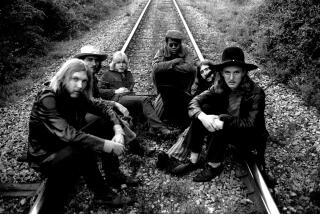Rhino Offers Look Back at Everly Brothers
- Share via
For the casual Everly Brothers fan, Rhino Records’ “Cadence Classics: Their 20 Greatest Hits” is an ideal survey of the duo’s early years.
The 46-minute package, released on compact disc in 1984, contains the 14 Top 10 hits--including “Bye Bye Love” and “Wake Up Little Susie”-- that established Don and Phil Everly as one of the most important teams in ‘50s rock. Their exquisite, country-tinged harmonies influenced everyone from the Beatles to Simon & Garfunkel.
For the Everlys’ devotee, however, Rhino’s four new CD collections are equally essential--especially a revealing 43-minute collection of outtakes from the pair’s Nashville recording sessions.
On the outtakes album (“All They Had to Do Was Dream”), you can hear the Everlys, producer Archie Bleyer and the ace studio musicians (including guitarist Chet Atkins and pianist Floyd Cramer) trying to find the most appealing arrangements for the songs.
The CD includes such informal moments as the time when one Everly asks if the just-finished version of “Wake Up Little Susie” wasn’t a little too slow. A few seconds into the next (14th!) attempt at the song, he gets confused and explains good-naturedly, “I’m concentrating (so much) on the (guitar) introduction (that) I can’t think of the words, too.”
The other three albums include “The Everly Brothers,” the pair’s debut album in April, 1958. Though it duplicates six of the tracks on the “Cadence Classics” CD, it contains interesting remakes of several rock hits of the day, including Little Richard’s “Rip It Up” and Gene Vincent’s “Be-Bop-A-Lula.”
“Songs Our Daddy Taught Us” was the Everlys’ second album, a roots-oriented collection whose entries included the old Gene Autry hit “That Silver Haired Daddy of Mine.” It was a daring concept because it was so far removed from the teen-rock tenor of the times.
“The Fabulous Style of the Everly Brothers” is a reshuffling of pair’s third studio collection (May, 1960), replacing some tunes that had also appeared on the first album with other material.
Gary Stewart, vice president of artists and repertoire for Rhino, said the three regular studio albums are budget entries (retailing for under $10), while the “Dream” is a full-priced CD.
Reviews
Bob Seger’s “Beautiful Loser” (Capitol)--Seger was still in his 20s when he recorded this 1975 album, but he was already exploring the “maturity” themes that he would use to advantage in such albums as 1977’s “Night Moves” and 1980’s “Against the Wind.” Though this doesn’t have the focus or instrumental punch of those works, the highlights mark an important step in the heartland rocker’s development. On a scale of one (poor) to four (excellent) checks: ***
Andy Williams’ “Greatest Hits” (Columbia)--This budget package sidesteps Williams’ early, rock-tinged Top 10 hits (including “Are You Sincere” and “Lonely Street”) in favor of the easy listening ‘60s ballads (including “Moon River” and “Days of Wine and Roses”) that established Williams as the successor to Perry Como’s title as America’s best-selling relaxed singer. However, Williams doesn’t have the vocal purity and character of Como. **
More to Read
The biggest entertainment stories
Get our big stories about Hollywood, film, television, music, arts, culture and more right in your inbox as soon as they publish.
You may occasionally receive promotional content from the Los Angeles Times.










